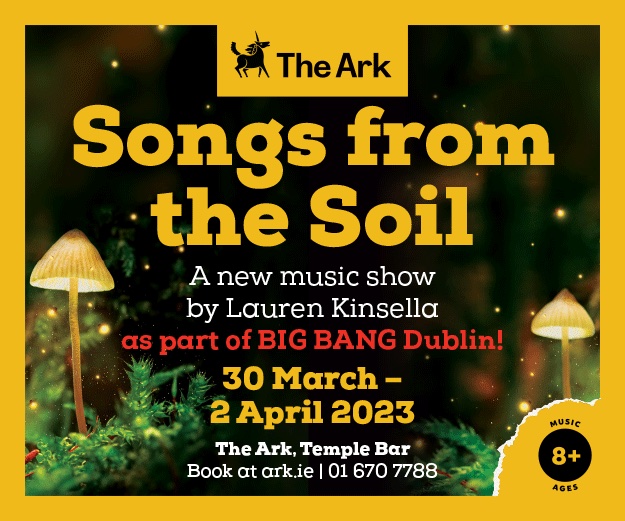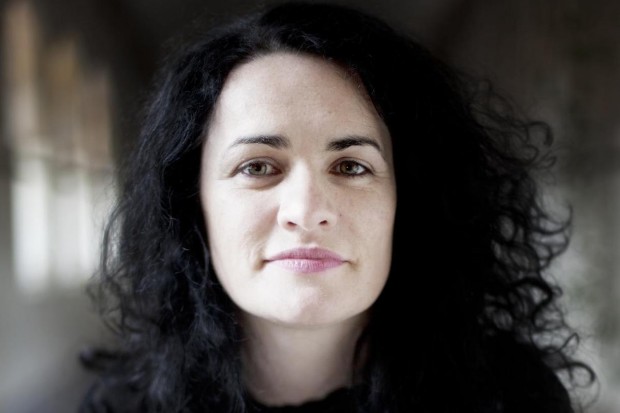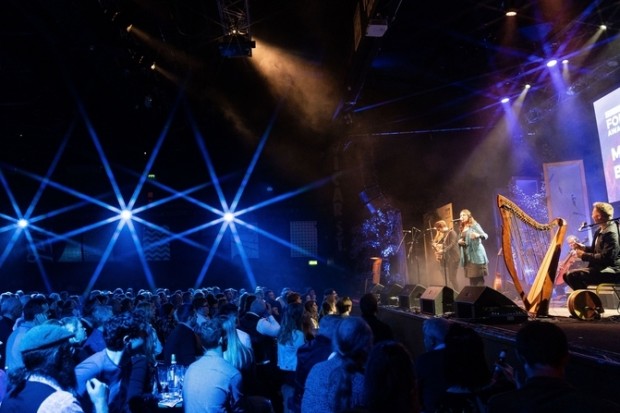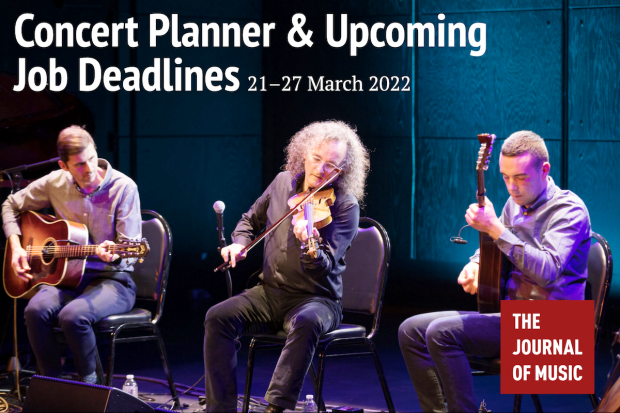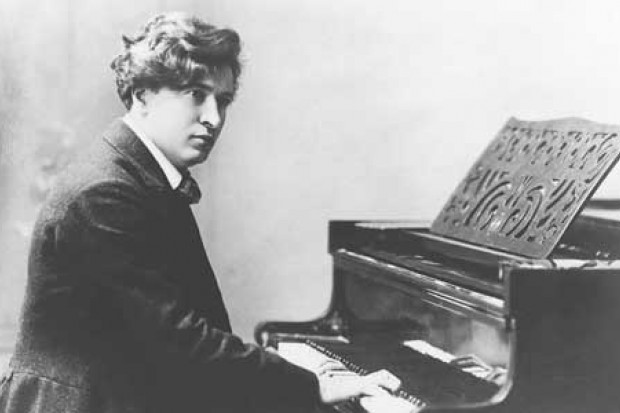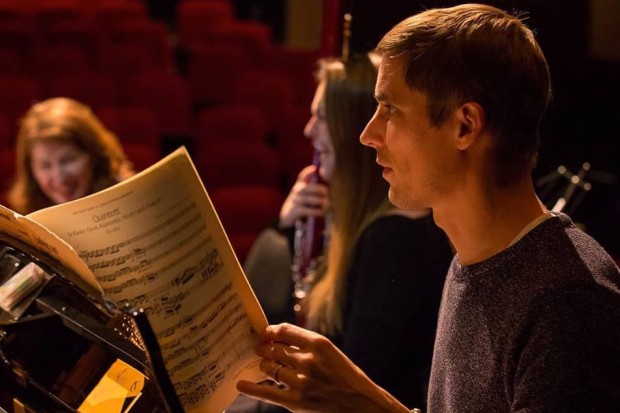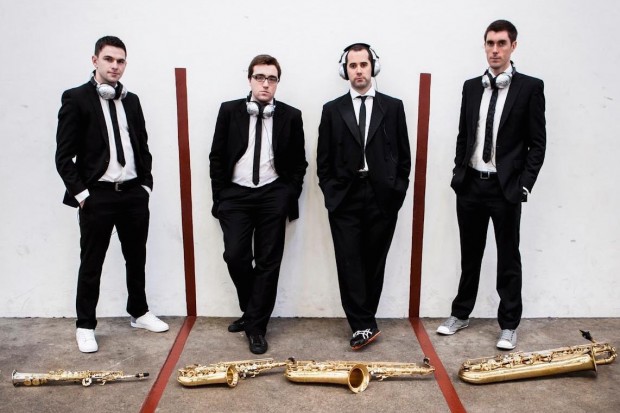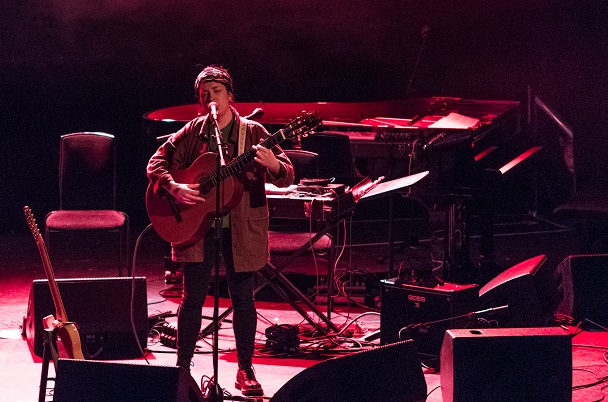
Lisa O’Neill (Photo: Julia Dunin)
Voices Louder Than Ever
Galway’s year as European Capital of Culture launched on a disappointing note, as the opening ceremony on 8 February was cancelled due to bad weather. Storm Ciara hurtled across the country bringing with her extreme winds, rain and snow to the demise of the promised spectacular. One of the first programmed events of the year, however, took place two days later. ‘Imagining Ireland’, an evening of music and spoken word by female artists, with the theme of ‘Speaking Up, Singing Louder’, gathered prominent Irish and UK-based artists to highlight women’s voices, stories and art. It seemed all too fitting, then, that the strong feminine energy present on stage, and in the audience, was amplified by Storm Ciara, still ravaging the city all around us outside a packed Black Box Theatre.
The line-up featured a combination of musicians and writers, including songwriter Sorcha Richardson, Radie Peat of Lankum, indie-pop artist SOAK, folk singer Lisa O’Neill, and a new ensemble created especially for the concert by cellist Kate Ellis, performing with percussionist Emma King, Linda Buckley on electronics and pianist Eliza McCarthy. Poet and rap artist Denise Chaila also performed, and writers Sinéad Gleeson, Sara Baume, Caelainn Hogan, Elaine Feeney and Sarah Moss read poetry and excerpts from their writing.
SOAK (Photo: Julia Dunin)
Crashing cymbals
A layer of smoke drifted above the stage, which was set up with several stations for performance. King played the first piece of the night. Crashing cymbals and loud rhythmic percussion emanated but despite King’s skill and precision it was somewhat lost due to the poor acoustics in the venue, which made the brash percussion sound tinny and harsh on the ears.
Solo on electric Telecaster guitar, Richardson performed tracks such as ‘First Prize Bravery’ and ‘Don’t Talk About it’ from her recently released debut album First Prize Bravery. The sound was stripped back compared to her album, though the instrument filled the space. Perhaps if she had accompaniment on bass and drums, the sound would have been more full-bodied, but Richardson, whose work stands out among the current generation of singers for its authenticity and freshness, was a perfect addition to the bill.
As the night progressed, the musical performances were intersected with spoken word. Sinéad Gleeson read an excerpt from her book Constellations, telling what appeared to be a personal story about growing through her twenties and thirties and the pressures and expectations to be maternal. English writer Sarah Moss read a poem from the perspective of an outsider looking in, imagining what Ireland is really like, and Caelainn Hogan read from her book Republic of Shame, recounting stories from her time spent in Tuam, researching the mother and baby home and its interaction with the locals.
Spoken word and rap artist Denise Chaila performed two pieces, ‘Anseo’ and ‘Dual Citizenship’, both of which dissected her experience of growing up with Zambian and Irish nationalities. Sincerity and wit exuded from her as she told tales of Africa, Cú Chulainn, and the racial prejudice she has experienced.
Ambient mesh
Ellis, King, Buckley and McCarthy performed a number of works on cello, electronics, piano and percussion, including Deirdre Gribbon’s E1027, Siobhán Cleary’s Chaconne and works by Ellis and Buckley. With prominent synth and clashing sounds, the music of the four came together in an ambient mesh, as McCarthy played the piano from its innards and scraped what looked like a guitar string across it, as if she were flossing the instrument.
Derry pop artist SOAK later took to the stage with a drummer and bassist who also played synth. Tracks such as ‘Knock Me Off My Feet’ and ‘All Aboard’ were probably the most upbeat of the evening and a welcome inclusion on the line-up.
Folk singer Radie Peat started her performance with ‘Still I Love Him’, a song associated with Ewan MacColl and Peggy Seeger. A melody in a minor key created a foreboding atmosphere, as Peat’s piercing vocals told a story of domestic abuse, accompanied by subtle pedal notes on accordion. She followed this with renditions of ‘The Granite Gaze’ and Galway singer Maija Sofia’s song ‘The Wife of Michael Cleary’.
Radie Peat (Photo: Julia Dunin)
Storytelling tradition
Cavan folk singer and storyteller Lisa O’Neill’s performance came last, and despite the three-hour duration of the concert (on a Monday), she was worth the wait. The theme of the night was present in O’Neill’s performance too as she sang Sinéad O’Connor’s ‘Three Babies’, a desolate tale of motherhood and the tragedy of losing a child, with O’Neill singing the chorus like a lament as she fingered the strings of her acoustic guitar – ‘The face on you/ The smell of you/ Will always be with me’.
O’Neill precedes each song she sings with its story, keeping the tradition of storytelling as a key part of her expression. ‘Violet Gibson’, which she wrote about an Irish woman who tried to kill Italian fascist leader Benito Mussolini, followed, and she ended her set with Nina Simone’s ‘Four Women’. O’Neill’s set appeared to me as an homage to the stories of desperate and oppressed women.
During the whole gig, I felt the gravity that the event had. Real-life stories including personal experiences, historical tragedies and universal themes of domestic abuse and ignorance towards women were all addressed through this culmination of art, creativity and storytelling, and yet, it was uplifting and hopeful. There was humour and positivity and I left the Black Box Theatre inspired by the talent and confidence of the women that took to the stage. Are we now living in an Ireland where women’s stories and experiences are no longer being shut down or disregarded, but listened to, even celebrated? It certainly felt that way.
For upcoming Galway 2020 events, visit https://galway2020.ie/en/programme/
Published on 13 February 2020
Shannon McNamee is Assistant Editor of the Journal of Music.







